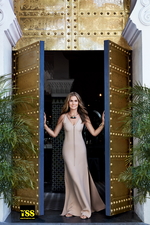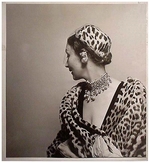Balenciaga Rosabotanica (2014): Of Roses & Humanity in Perfumery {Perfume Review & Musings} {New Fragrance} {Rose Notebook}
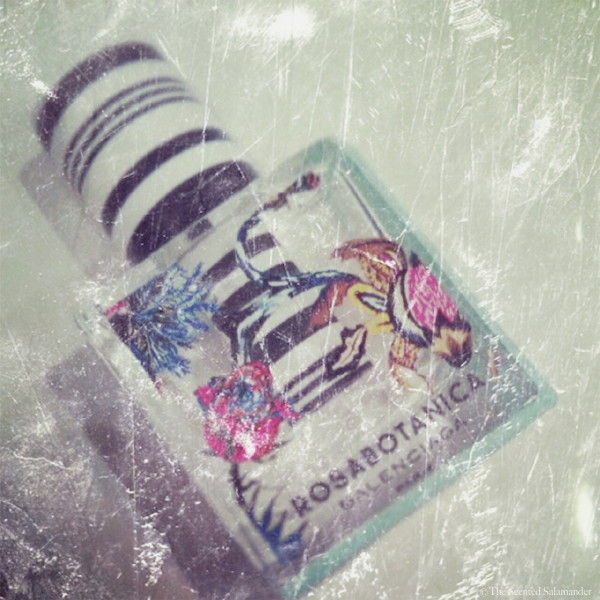
Blurring Roses and Styles
Of Roses and Humanity in Perfumery
Of the designer perfume launches of 2014, Rosabotanica by Balenciaga is one of the most obvious examples of a fragrance sold via stampeded market places like Sephora, which has been reconceptualized thanks to the more focused and conceptual codes of niche perfumery. Yes, the great paradox here is that niche perfumery is spilling into the mainstream...
Created by perfumers Olivier Polge and Jean-Christophe Hérault, who are exemplary personnifications of what professional perfumery is with important bestsellers to their credits, such as Dior L'Homme for the first and Paco Rabanne 1 Million for the second one, it is almost amusing to see the two industry noses opening up a playing ground for new olfactory atmospheres at Balenciaga, as if they were composing for an up and coming niche house.
We have always believed that the two domains are in fact contiguous and the lines often blurred but still, you can tell about some cultural differences and nuances between the two. Some Sephoras have distinct niche sections in their perfumeries with a store corner showcasing a few select brands. Rosabotanica could be living there instead of across the aisle with the other just-beautiful perfumes. Self-respecting, art-conscious niche perfumes wish to intrigue, surprise, and play with your expectations - Rosabotanica fits the bill.
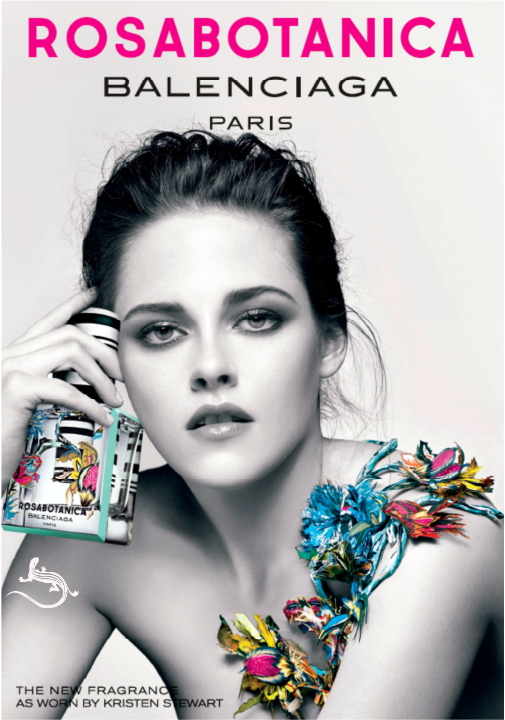
For those who remember Le Feu d'Issey, Rosabotanica can be said to be structurally fitting the same niche void left within designer perfumery that it once held. There is even that same milky, lactonic accord which instead of coming across as purely regressive and comforting has been skillfully employed to create a sense of oddity and quirkiness - like in Le Feu. It actually borrows quite a bit from the niche opus Hermès Un Jardin Après La Mousson.
This Space-Oddity aspect is one well represented incidentally by the public persona of fragrance spokesperson Kristen Stewart. We think that by now everyone has gotten the memo about the blockbuster-to-indie darling's capacity for weirdness and her slightly strange aura, despite the fact that she looks like a pretty girl.
While the original Florabotanica (2012) in the series - by the two same perfumers - was trying harder to impress in the looks department than through the more discreet perfume creation itself, there has been a change of heart since then. Rosabotanica is keeping its very distinctive bottle design mixing elements of space ship design with baroque luxury tapestry florals, merging a Mod ambiance with a more refined version of The Little Shop of Horrors' carnivorous plants: the flowers on the glass face of the flacon could be growing there, or on an Avatar movie set. It is both futuristic and classic; the perfume has finally caught up with its external appearance.
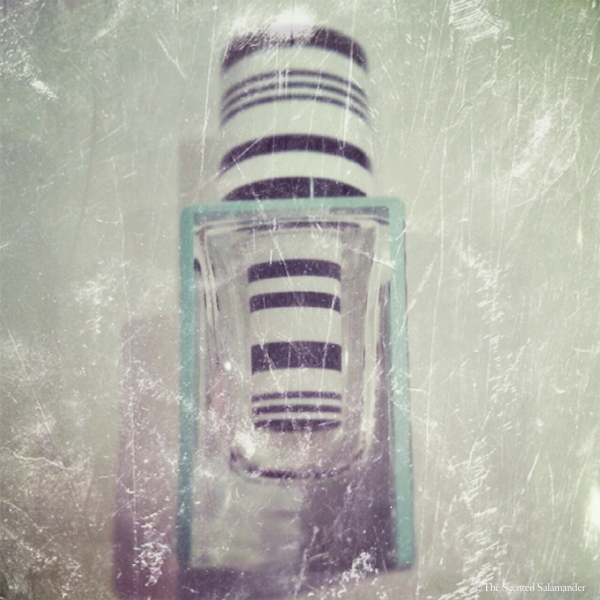
The composition itself is now that of an offbeat rose dipped in creamy mint and bubblegum. It is surprising to the nose at first and then not just convincing but also easy to wear in fact thanks to the scent skin-enhancing qualities.
The brief was to aim for a novel, experimental rose accord which would be very natural and vegetal-smelling while being defined by modernity and contemporaneity. The perfumers counterpoised a hyacinth note to the rose one to deconstruct it a bit.
Rosabotanica opens on both a fresh and peppery sensation in the top notes while the curious rose accord is immediately apparent, both rich and traversed by cool mint and then warmed up by milk. The lactonic effect is said to rest on a green fig leaves accord which adds also a very subtle fruity hint of sweetness. The "mint" is not listed but its provenance can be ascribed to a camphoraceous facet of cardamom. When you step back from the details, it mostly smells of a minty and milky rose with light and round hesperidic accents. The perfumers themselves describe the scent as,
"a very vegetal rose, enchanted and spicy, sublimated and softened by a touch of citruses and white woods."
There is a tension in perfumery creation which is that nature is the mother of all inspirations, yet it is also important to step away from it lest you be called a slave to it and a plain, unimaginative copist. There is nothing more boring, after a while, when you a smell a perfume which is only a perfect copy of a beautiful rose. Yes, you might be colored impressed at first, but then you will be wanting conversation with an intelligent, sentient human being; and perfumes are human, this is why we can be so touched by them. They are roses with emotions. Or they can be dreamt roses. A rose in perfumery is closer to the rose in Le petit prince by Saint Exupéry than the one held by its roots in your garden: it has been filtered by imagination and desire.
Nevertheless, perfumers and perfume lovers alike love nature. The vegetalism of the rose in Rosabotanica is that deep link with nature, reasserted. At the same time, the composition has been carefully crafted so as to create an imaginary rose, one which can only exist in the eye of your mind.
Where Rosabotanica is good at is at creating a sense of satisfying renewal of olfactory sensations. It makes you stop and inhale deeper to grasp its personality. A comparable perfume like the rose + mint Les Parfums de Rosine Diabolo Rose (2007) is a priori niche in branding, yet more classical in its personality than Rosabotanica.
While the composition here is said to be complex, it translates as a simple and well-circumscribed idea, a trait of archetypal niche perfumes. The complexity of the scent is revealed almost instantly and does not evolve very much overtime. It is light and tasteful. Like some of the most recognizable niche scents, it cannot boast of a very long development and change of moods in its life course. It therefore somehow gives up one type of complexity for another one, the conceptual one. It abandons what some of the best designer perfumes are good at: adding on the complexity of time, moodiness, secret nuances. Is this saying that Rosabotanica is a bit stereotypical in its aesthetic choices? Maybe. What is most assured of leaving a lasting impact are perfumes made by personalities benefiting from the luxury of time, not by schools of thought. But below the level of masterpiece, Rosabotanica can be called an accomplished perfume.








